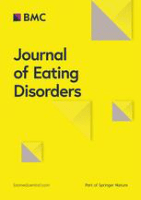
Journal of Eating Disorders
Scope & Guideline
Empowering professionals with cutting-edge research.
Introduction
Aims and Scopes
- Research on Eating Disorder Pathology:
The journal publishes studies focused on the psychological, biological, and social factors contributing to the development and maintenance of eating disorders, including anorexia nervosa, bulimia nervosa, and binge eating disorder. - Innovative Treatment Approaches:
It emphasizes the exploration of novel treatment modalities, including pharmacological interventions, psychotherapies, and integrative therapeutic approaches, to enhance recovery outcomes for individuals with eating disorders. - Impact of Social and Cultural Factors:
Research addressing how societal influences, cultural norms, and media representations shape body image and eating behaviors, particularly among vulnerable populations such as adolescents and marginalized groups. - Longitudinal and Developmental Studies:
The journal supports longitudinal research examining the progression of eating disorders over time, including risk factors, resilience, and recovery trajectories. - Interdisciplinary Perspectives:
Encouraging contributions from various fields such as psychology, psychiatry, nutrition, and public health, the journal promotes a comprehensive understanding of eating disorders. - Lived Experience and Patient-Centered Research:
It values qualitative studies and narratives that incorporate the voices of individuals with lived experiences of eating disorders, focusing on their treatment journeys and recovery processes.
Trending and Emerging
- Digital Interventions and Telehealth:
The recent surge in studies investigating the effectiveness of digital therapies and telehealth solutions for eating disorders is notable, particularly in the context of the COVID-19 pandemic, which has necessitated alternative treatment modalities. - Intersection of Eating Disorders and Mental Health:
There is an increasing focus on the comorbidity of eating disorders with other mental health conditions, such as anxiety, depression, and autism spectrum disorders, emphasizing the need for integrated treatment approaches. - Cultural and Societal Influences:
Emerging research explores the impact of cultural factors, media consumption, and societal pressures on body image and eating behaviors, particularly in diverse populations and among youth. - Personalized and Precision Medicine:
The journal is trending towards studies that advocate for personalized treatment approaches based on individual characteristics, including genetic, psychological, and sociocultural factors. - Recovery and Resilience Frameworks:
There is a growing body of work dedicated to understanding recovery processes, resilience factors, and the role of lived experiences in overcoming eating disorders, highlighting the importance of patient-centered care.
Declining or Waning
- Traditional Diagnostic Criteria:
The emphasis on strict adherence to traditional diagnostic criteria for eating disorders appears to be waning, as newer research advocates for more flexible and nuanced approaches that consider individual experiences and presentations. - Solely Quantitative Research:
There has been a noticeable reduction in purely quantitative studies, as the field increasingly recognizes the value of qualitative insights and mixed-method approaches to capture the complexity of eating disorders. - Stigmatization of Eating Disorders:
Research focusing solely on the stigmatization of eating disorders, while still relevant, has decreased in frequency as the journal shifts towards more actionable insights and interventions to combat stigma.
Similar Journals

Revista Mexicana de Neurociencia
Championing Quality Research in Neuropsychology and Public HealthThe Revista Mexicana de Neurociencia, published by the ACAD MEXICANA NEUROLOGIA, serves as a pivotal platform for the dissemination of research within the field of neurology and neuroscience. Although it was active from 2008 to 2014 and is no longer covered in Scopus, the journal still holds a significant place in the academic community, addressing critical topics relevant to both clinical and experimental neurology. With an emphasis on advancing knowledge in neuropsychology and public health, this journal targets researchers, professionals, and students alike, fostering an interdisciplinary dialogue that can enhance the understanding of neurological conditions within Mexico and beyond. As it stands, the journal is not open access, which may present challenges for accessibility, yet its affiliation with recognized academic standards underlines its commitment to quality research. This platform once provided insights that can inform practice and stimulate innovative approaches in the management of neurological disorders, underscoring its importance in the evolving landscape of neuroscience.

Nutricion Clinica y Dietetica Hospitalaria
Advancing Dietary Practices for Better Health Outcomes.Nutricion Clinica y Dietetica Hospitalaria is a prominent journal dedicated to the field of clinical nutrition and dietetics, published by the SOC ESPANOLA DIETETICA & CIENCIAS ALIMENTACION-SEDCA. Established in Spain, this journal has been a crucial platform for disseminating research and advancements in nutrition since its inception in 1981. Although currently indexed in the lower quartiles (Q4) of the medicine and nutrition categories for 2023, its contributions remain vital to healthcare professionals and researchers focused on enhancing dietary practices and clinical outcomes. The journal operates without open access, requiring institutional subscriptions for full articles, making it a selective source for scholarly work addressing the complexities of dietetics in a hospital setting. As a member of the global conversation on nutrition, Nutricion Clinica y Dietetica Hospitalaria encourages interdisciplinary dialogue and aims to promote evidence-based nutritional practices, hoping to elevate health standards and patient care through innovative research.
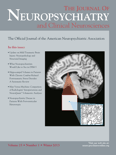
JOURNAL OF NEUROPSYCHIATRY AND CLINICAL NEUROSCIENCES
Bridging Psychiatry and Neurology for Better Mental HealthThe JOURNAL OF NEUROPSYCHIATRY AND CLINICAL NEUROSCIENCES, published by AMER PSYCHIATRIC PUBLISHING, INC, stands as a pivotal resource in the interdisciplinary fields of psychiatry, neurology, and mental health. With a history spanning from 1989 to 2024, this esteemed journal, identified by the ISSN 0895-0172 and E-ISSN 1545-7222, provides a platform for cutting-edge research and clinical insights into neuropsychiatric disorders. As of 2023, the journal is recognized in Q2 quartiles for Medicine (miscellaneous), Neurology (clinical), and Psychiatry and Mental Health, showcasing its significant impact within these domains, as evidenced by its Scopus rankings placing it in the 67th and 65th percentiles respectively. The journal emphasizes the importance of advancing knowledge through empirical studies, case reports, and reviews, making it an invaluable asset for researchers, clinicians, and students dedicated to understanding the complexities of the human brain and its psychological manifestations. Although the journal does not currently offer open access, it remains essential for those seeking to stay at the forefront of neuropsychiatric advancements.
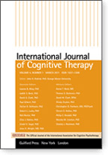
International Journal of Cognitive Therapy
Enhancing Understanding of Mind and Method.International Journal of Cognitive Therapy is a distinguished peer-reviewed journal dedicated to advancing the field of cognitive therapy and its empirical applications. Published by SPRINGER INT PUBL AG, this journal is positioned within the vibrant landscape of Experimental and Cognitive Psychology, reflecting a commitment to rigorous academic standards with a 2023 impact factor that underscores its relevance and influence (Rank #67/165 and 59th percentile on Scopus). Established in 2008, the journal covers a wide array of topics, promoting research that enhances theoretical frameworks and clinical practices in cognitive therapy. Although it operates under a subscription model, its contributions are pivotal for researchers, professionals, and students alike who seek to deepen their understanding of cognitive processes and psychotherapeutic methods. As it converges towards its future until 2024, the journal continues to foster scholarly dialogue and innovation in the cognitive therapy domain.
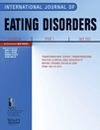
INTERNATIONAL JOURNAL OF EATING DISORDERS
Shedding light on eating disorders to empower clinicians and researchers.International Journal of Eating Disorders, published by Wiley, stands as a premier platform for disseminating high-quality research in the field of psychiatry and mental health, particularly focusing on eating disorders. With a respectable impact factor and ranking in the 91st percentile among its peers, this journal is recognized for its rigorous peer-review process and commitment to advancing understanding through empirical evidence. Established in 1981, it has continually evolved, maintaining its status as a Q1 journal in the Scopus category of Psychiatry and Mental Health. The Journal is committed to exploring the multifaceted nature of eating disorders, providing vital insights that support clinicians, researchers, and students alike in their pursuit of knowledge and innovation. Although access is not currently open, the journal offers a wealth of valuable resources for those engaged in cutting-edge research and clinical practice related to eating disorders.
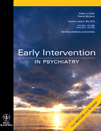
Early Intervention in Psychiatry
Empowering Change: Early Steps in Mental Health ResearchEarly Intervention in Psychiatry, published by WILEY, is an esteemed academic journal dedicated to advancing the field of psychiatry and mental health through rigorous research and innovative practices. Established in 2007 and continuing through 2024, this journal serves as a critical resource for researchers, clinicians, and students interested in the early detection and treatment of psychiatric disorders. With an ISSN of 1751-7885 and an E-ISSN of 1751-7893, it is recognized for its significant contributions, placing in the Q3 quartile in Biological Psychiatry and Q2 in Psychiatry and Mental Health as of 2023. The journal boasts impressive Scopus rankings, being placed 12th in Nursing - Psychiatric Mental Health and 27th in Neuroscience - Biological Psychiatry, showcasing its impact within the scientific community. While not an open-access journal, its findings are pivotal for those seeking to enhance mental health interventions. Early Intervention in Psychiatry is committed to fostering knowledge and improving practices that ultimately contribute to better mental health outcomes globally.
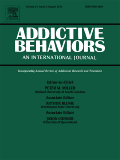
ADDICTIVE BEHAVIORS
Innovative Insights into Addiction and RecoveryADDICTIVE BEHAVIORS is a prestigious journal published by PERGAMON-ELSEVIER SCIENCE LTD, specializing in the critical examination and exploration of addiction-related issues across diverse fields including Clinical Psychology, Psychiatry and Mental Health, and Toxicology. With a robust history dating back to 1975 and convergence extending to 2024, the journal is esteemed for its rigorous peer-reviewed research that contributes significantly to understanding addiction phenomena. Ranked in the Q1 category for its focus areas, it stands out within the academic community, evidenced by its impressive Scopus rankings—25th in Clinical Psychology and 14th in Toxicology—placing it in the top tier of its disciplines. This journal offers valuable insights into addiction behaviors, treatment methodologies, and public health implications, making it an essential resource for researchers, practitioners, and students seeking to advance their knowledge and impact the field. Although not Open Access, it provides vital access options for institutions and individuals invested in addiction studies.
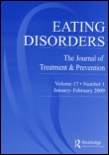
Eating Disorders
Bridging the gap between clinical practice and academic research.EATING DISORDERS, published by ROUTLEDGE JOURNALS, TAYLOR & FRANCIS LTD, is a premier academic journal dedicated to advancing the understanding of eating disorders from diverse psychological, medical, and social perspectives. With an ISSN of 1064-0266 and an E-ISSN of 1532-530X, this journal is recognized for its rigorous peer-reviewed research and innovative studies, contributing significantly to the field of clinical psychology and psychiatry. It boasts impressive rankings, including a Q1 classification in Clinical Psychology and a Q1 classification in Medicine (miscellaneous) based on the 2023 category quartiles. Researchers will find its impactful insights invaluable, as it ranks 31st out of 311 in clinical psychology, placing it in the top 10% percentile. Although this journal is not open access, it encompasses a comprehensive range of topics related to eating disorders, fostering a deeper understanding that benefits practitioners, researchers, and students alike. For those dedicated to addressing the complexities of eating disorders, EATING DISORDERS is an essential resource that bridges the gap between research and real-world application.

RBNE-Revista Brasileira de Nutricao Esportiva
Empowering Athletes with Evidence-Based NutritionRBNE - Revista Brasileira de Nutrição Esportiva is a pivotal open-access journal dedicated to advancing the field of sports nutrition. Published by the Instituto Brasileiro de Pesquisa & Ensino Fisiologia Exercício (IBPEFEX) since 2007, RBNE aims to disseminate high-quality research that bridges the gap between nutritional science and athletic performance. With its commitment to accessibility and rigor, the journal provides a platform for researchers, practitioners, and students to share innovative findings and practical applications in sports nutrition. Although specific indexing metrics like H-Index and Scopus rankings are not currently listed, the journal's open access policy enhances its visibility and reach within the academic community, making it an essential resource for anyone involved in the intersection of nutrition and exercise science. The journal's work is vital in supporting athletes and fitness professionals in optimizing health and performance through informed nutritional strategies.

Eating and Weight Disorders-Studies on Anorexia Bulimia and Obesity
Transforming Perspectives on Eating Disorders and Weight IssuesEating and Weight Disorders-Studies on Anorexia Bulimia and Obesity, published by SPRINGER, is a pivotal journal in the fields of Clinical Psychology and Psychiatry that addresses the multifaceted issues surrounding eating disorders, including anorexia, bulimia, and obesity. With an impressive impact factor reflecting its commitment to quality research, this journal is ranked in the Q2 quartile for both Clinical Psychology and Psychiatry and Mental Health. The journal has transitioned to an Open Access model as of 2023, broadening its reach and facilitating greater access to vital research findings in the areas of eating behaviors and weight management. Operating from its base in Switzerland, Eating and Weight Disorders serves as an essential resource for researchers, clinicians, and students alike, presenting high-quality empirical studies, reviews, and case reports that contribute significantly to the understanding of these complex conditions. With a rich publication history dating back to 1998, the journal continues to maintain its relevance in the ongoing discourse surrounding mental health and weight issues on a global scale.